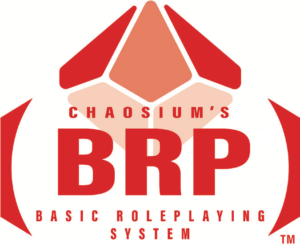All characters have trained abilities described in 2.6 Skills, with ratings ranging from 00% (no chance of success) to 100% or higher (almost always succeeding). A character’s skill points are added to the skill’s base chance for a total chance of success. The process is simple: the player or gamemaster announces that a character will attempt a skill. A percentage dice roll is made. If the roll is equal to or less than the chance of success, the skill succeeds (with appropriate results). If the roll is over the chance of success, the skill fails.
There are two other conditions to keep in mind when attempting a skill roll: difficulty and the special success. These are described below.
Difficulty: Use of a skill isn’t always cut and dried. It’s more difficult to drive a car in the dark during heavy rain than it is to drive it in the middle of day in perfect weather. A wide variety of conditions (weather, distractions, equipment, etc.) can affect whether it’s easy or more difficult to use a skill. To simulate this, skills can be modified in the following ways.
- Automatic: When it’s completely certain that the character will succeed, and when there’s nothing major at stake (no life-or-death situation, no challenge, etc.), the skill automatically succeeds. Don’t even bother to roll.
- Easy: Some combination of circumstances, conditions, or other assistance has made it easier to perform the skill. In this case, double the skill chance. Dice should still be rolled even if the skill chance is now over 100%, however, as there’s still the chance of a special success or a failure (both are described below).
- Normal: This is the standard, meaning that any conditions, circumstances, etc. are negligible and won’t affect the chance to use the skill.
- Difficult: If a skill would be made more difficult by some circumstance, condition, or other situation, divide the skill chance in half (rounding up).
- Impossible: If it’s simply impossible for the skill to succeed, such as a normal human attempting to leap 100 meters into the air unaided, or solve a crossword puzzle in absolute darkness, no roll should be allowed. The skill attempt just fails, with any appropriate consequences. The gamemaster may either declare no roll can be attempted, or let the player roll and describe how badly they fail in the attempt.
Section 6. Spot Rules covers a few situations where difficulties are applied, though for the most part these should be obvious and assigned by the gamemaster where appropriate. For example, the gamemaster may announce that fighting in near dark makes all skills Difficult, half their normal chance.
Special Success: Not all successes are equal. Sometimes a skill use is ‘just right,’ and the result is better than normal. In this case, the result is called a special success. A special success is equal to one-fifth (1/5) the chance of success, rounded up (use the final chance if modified by a difficulty). For example, a skill of 60% means that any roll of 01 through 12 is a special success (as 12 is 1/5 of 60%).
In normal skill use, a special success means that the skill succeeded especially well and should have an enhanced result. The exact result should be left up to the gamemaster to determine, but as a rule of thumb, it should be twice as good as a regular success. In combat, a special success does additional damage, and is described in 5.13 Special Successes.

